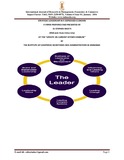Please use this identifier to cite or link to this item:
https://cris.library.msu.ac.zw//handle/11408/1670Full metadata record
| DC Field | Value | Language |
|---|---|---|
| dc.contributor.author | Nhuta, Stephen | - |
| dc.date.accessioned | 2016-07-08T09:58:59Z | - |
| dc.date.available | 2016-07-08T09:58:59Z | - |
| dc.date.issued | 2016-01 | - |
| dc.identifier.issn | 2250-057X | - |
| dc.identifier.uri | http://hdl.handle.net/11408/1670 | - |
| dc.description | A paper prepared and presented by Dr Stephen Nhuta (Midlands State University) at the “Update on current affairs seminar” by the Institute of Chartered Secretaries and Administrators in Zimbabwe | en_US |
| dc.description.abstract | There was a serious economic crisis in the 20th century which witnessed the entry of governments into large areas of the economy that had been in the past exclusive to private hands. To alleviate depressions, there was need to adopt programs to do with job reeducation programs, government employment of the previously unemployed, and increased public welfare responsibilities. The economic crisis period 2000 to 2009 discredited the leadership and management practices triggering a wave of thinking and experimentation. This crisis will be a powerful catalyst for change in both the theory and practice of leadership and governance. Therefore it does highlight the rapid changes in board practices and articulates some clear direction for change both in the structure for governance and management, and in the characteristics that leaders will have to display. It goes without saying that widespread recognition of reality is the crucial step before problems can be solved. In other words Leaders can't solve problems if they don't acknowledge their existence. Leaders breed trouble by assuming that a strong market position is an insurance policy against trouble. Leadership indecision, decisions and unstable character had led economies into a depressed state for which its governments, lacking leadership capabilities, were unable to prescribe valid solution to halt the early noticed vacillating signs of failure. The consequence of the actions of the bad leadership decision is the imposing poverty, inequality and growing insecurity which it is now the present leadership is finding it difficult to remedy. The leaders we need now will have the perspective, the mentality, the confidence, and the authority to call for radical changes in direction. | en_US |
| dc.language.iso | en | en_US |
| dc.publisher | International Journal of Research in Management, Economics & Commerce | en_US |
| dc.relation.ispartofseries | International Journal of Research in Management, Economics & Commerce;Vol. 6, Issue 1 | - |
| dc.subject | Depression, economic downturn, strategic leadership, strategies | en_US |
| dc.title | Strategic leadership in a dressed economy | en_US |
| item.languageiso639-1 | en | - |
| item.grantfulltext | open | - |
| item.fulltext | With Fulltext | - |
| Appears in Collections: | Conference Papers | |
Files in This Item:
| File | Description | Size | Format | |
|---|---|---|---|---|
| LEADERSHIP IN A DEPRESSED ECONOMY International Journal of Research in Management, Economics & Commerce.pdf | Full Text | 920.38 kB | Adobe PDF |  View/Open |
Page view(s)
58
checked on Jul 26, 2024
Download(s)
32
checked on Jul 26, 2024
Google ScholarTM
Check
Items in MSUIR are protected by copyright, with all rights reserved, unless otherwise indicated.



